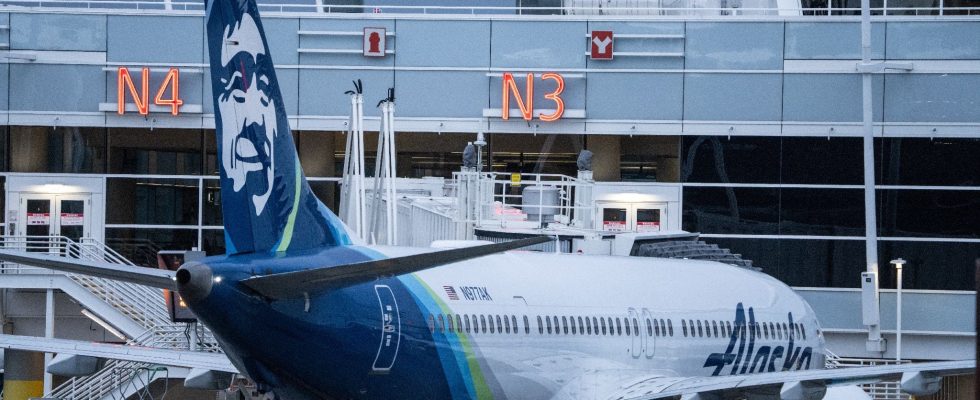An Alaska Airlines Boeing 737 MAX was forced to make an emergency landing in the United States after an escape door separated from the cabin in mid-flight. Initial inspections identified loose bolts on several devices. This incident is the latest episode in a long dark series for the North American aircraft manufacturer. In 2018 and then in 2019, two 737 MAXs from Lion Air and Ethiopian Airlines crashed, killing more than 300 people. Since the resumption of flights and production, the aircraft has suffered numerous technical problems. Aeronautical consultant Xavier Tytelman analyzes the origin of Boeing’s problems as well as its possible consequences for the group and its place in the sector.
L’Express: Two fatal crashes, multiple industrial problems and now a door that comes loose in mid-flight… Why is the 737 MAX accumulating setbacks? Is its manufacturer, Boeing, incapable of solving the design and manufacturing problems of its plane?
Xavier Tytelman: The aircraft’s initial design defect relating to its MCAS anti-stall system was corrected by Boeing. No accident linked to this tool has been observed since those of Lion Air and Ethiopian Airlines. On the other hand, aircraft manufacturers are experiencing structural difficulties in ensuring good quality control due to the increase in production volumes. This is all the more true as quality requirements are higher than in the past.
Beyond the manufacturers, the entire subcontracting chain is struggling to keep up, as demonstrated by the case of Boeing’s aerostructures supplier, Spirit AeroSystems. [NDLR : à l’origine de plusieurs problèmes de qualité sur le 747 MAX et qui semble impliqué dans le nouvel incident]. It’s not all Boeing’s responsibility. This does not change the fact that the industry absolutely needs to resolve these gaps between expected quality and reality, because this type of incident remains unacceptable. However, Boeing has identified poorly tightened bolts in planes other than the 737 MAX. At Airbus, the Skywise platform was developed internally to improve quality control. The tool has proven so effective that they now also sell it to airlines to ensure, for example, aircraft maintenance. That said, there are fears that the number of accidents will rise again in certain countries.
For what ?
There is a real problem of lack of planes in the world. It is unfortunately possible that there will be an increase in the number of accidents in certain countries linked to the oldest aircraft in the fleets. Hence the need for an increase in speed to have modern and more efficient aircraft. Whatever anyone says, it’s better to fly in a 737 MAX than in an old plane.
Airbus reached a historic high in order intake in 2023, ahead of its American rival. Can the new 737 MAX accident strengthen the Franco-German aircraft manufacturer’s place in global sales?
Of course this will benefit Airbus, not so much for safety issues as for other reasons, such as the homogeneity of the range. Historical customers remain all the more with Boeing as a fleet change remains a cumbersome process: you have to equip yourself with simulators, modify your maintenance, train your pilots, etc. The fact remains that the movements that we observe are almost always from Boeing to Airbus, very rarely the reverse. On medium-haul, Airbus is dominant and will strengthen its position, in particular thanks to a version of the A321 where it is monopolistic, the XLR, and with which Boeing cannot align itself. However, Boeing is not dead and continues to be the leader in long-haul and cargo transport. Not to mention that the games are open after 2035.
That’s to say ?
Several options are on the table to ensure the ecological transition of the aviation sector. Airbus is working hard on hydrogen, but we cannot guarantee that there will be breakthroughs in batteries. Unless sustainable SAF fuels ultimately appear to be the best solution. All this can upset the balance between players depending on who makes the winning bet.
Are Boeing’s new setbacks likely to facilitate the entry of new players into the market, such as the Chinese Comac?
From an industrial point of view, Chinese players like Comac do not yet represent a threat, because they do not know how to make engines: they rely on the French engine manufacturer Safran. Furthermore, Comac’s C919 production will not be able to meet even the demand of the Chinese market. Unless they carry out major consolidation operations, such as the acquisition of Embraer and other companies, China remains far from competition from a technological point of view in commercial aviation. In fact, the country accepts being dependent on Europe and the United States in this niche, but it has the ambition to join the Americans, or even surpass them in the field of defense.
.
